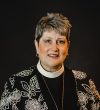Hillary Doerries was in graduate school when she was diagnosed with clinical depression and found herself wandering into a support group that met once a week in a United Methodist church in the town where she was living.
The group was life-changing, she said, because it showed her there were places where people could talk about the challenges of living with mental health issues, or caring for someone with mental health issues, with openness, authenticity, grace and dignity.
In the experience, Doerries said, she knew she had “found my people.”
So when Christ the King Lutheran in South Bend, Ind., started work on applying for a grant to start a mental health ministry, Doerries, who serves as the church’s director of music ministries, became involved because she believed it was important.
The result is a program called Fresh Hope, a faith-based support group for people living with a mental health challenge and for their loved ones, which meets weekly at the church.
The program began with the congregation seeking a $30,000 matching grant from the Center for Congregations in Indianapolis, which is funded by Lilly Endowment Inc. Doerries said the first step in applying for this grant was to send a team into the neighborhood around the church to listen to what the congregation could help them with.
“People were lonely and isolated,” she said. “As soon as I heard that, I kind of invited myself onto the committee. So many mental illnesses are diseases of isolation.”
Doerries describes Fresh Hope as “starting new conversations in the church with people who haven’t know how to talk about [mental illness] before.”
Doerries said the group thought it was essential for the congregation to start talking about issues around mental health in ways that were compassionate and loving. “The church has a complicated history with mental illness, and how we perceive people that are ‘different,’” she added.
“Groups like this deal with, really, how are we going to be human, and how are we going to do it together? It’s starting new conversations in the church with people who haven’t known how to talk about it before.”
The group started meeting in February 2020 but had only four or five sessions “and then the world kind of caught on fire” with pandemic disruptions, she said. Participants continued to meet virtually, then returned to meeting in person when vaccines, masks and other measures made the meetings safer.
Christ the King’s Fresh Hope group is connected to Fresh Hope for Mental Health, a Nebraska nonprofit founded in 2009 that has helped start 90 support groups in 12 countries.
Doerries said Christ the King opted to link with Fresh Hope because she met its founder when she attended a conference in San Antonio, Texas, while working to make connections as she was writing her dissertation on the link between mental health ministry and music ministry. She said she had the chance to hear the founder, Brad Hoefs, a former Lutheran Church–Missouri Synod pastor, speak.
“Once we received the grant, we could dive right in,” she said.
Part of a larger effort
Fresh Hope is one part of Christ the King’s efforts to formalize a larger mental health ministry. A second support group, called GriefShare, was begun at the church at about the same time by a woman who lost her husband in a car accident. “She felt like this would be a way to invite people in to talk about the hard things,” Doerries said. “Fresh Hope and GriefShare went hand in hand that way.”
Adding the mental health and grief support groups at Christ the King seemed a natural for a church that has shared its building with a counseling center started by one of the pastors 45 years ago. “So we have mental health professionals in our building, and they can give support,” Doerries said. “And both of our pastors are very open to issues of mental health and wellness.”
Doerries said they have worked together to highlight mental health during a Sunday morning liturgy during Mental Health Awareness Month.
“If one out of five people are living with a mental illness, there are people in the congregation suffering in silence.”
“It brings this ministry to a different level, being on a Sunday morning,” she said. “If one out of five people are living with a mental illness, there are people in the congregation suffering in silence. Bringing that to light in a biblical way on a Sunday morning, saying it’s OK to talk about these things, hearing your pastors talk about these things, it makes hard things easier to talk about.”
The congregation has also hosted an annual hymn festival, Healing and Hope, which is an evening of singing and storytelling, for the congregation to come together to recommit to this ministry. Doerries said the event has included a children’s choir from the University of Notre Dame, which was invited “because the pandemic really brought out mental health challenges in children.”
To read “The Body of Christ and Mental Illness,” an ELCA social message, visit elca.org/socialmessages.





